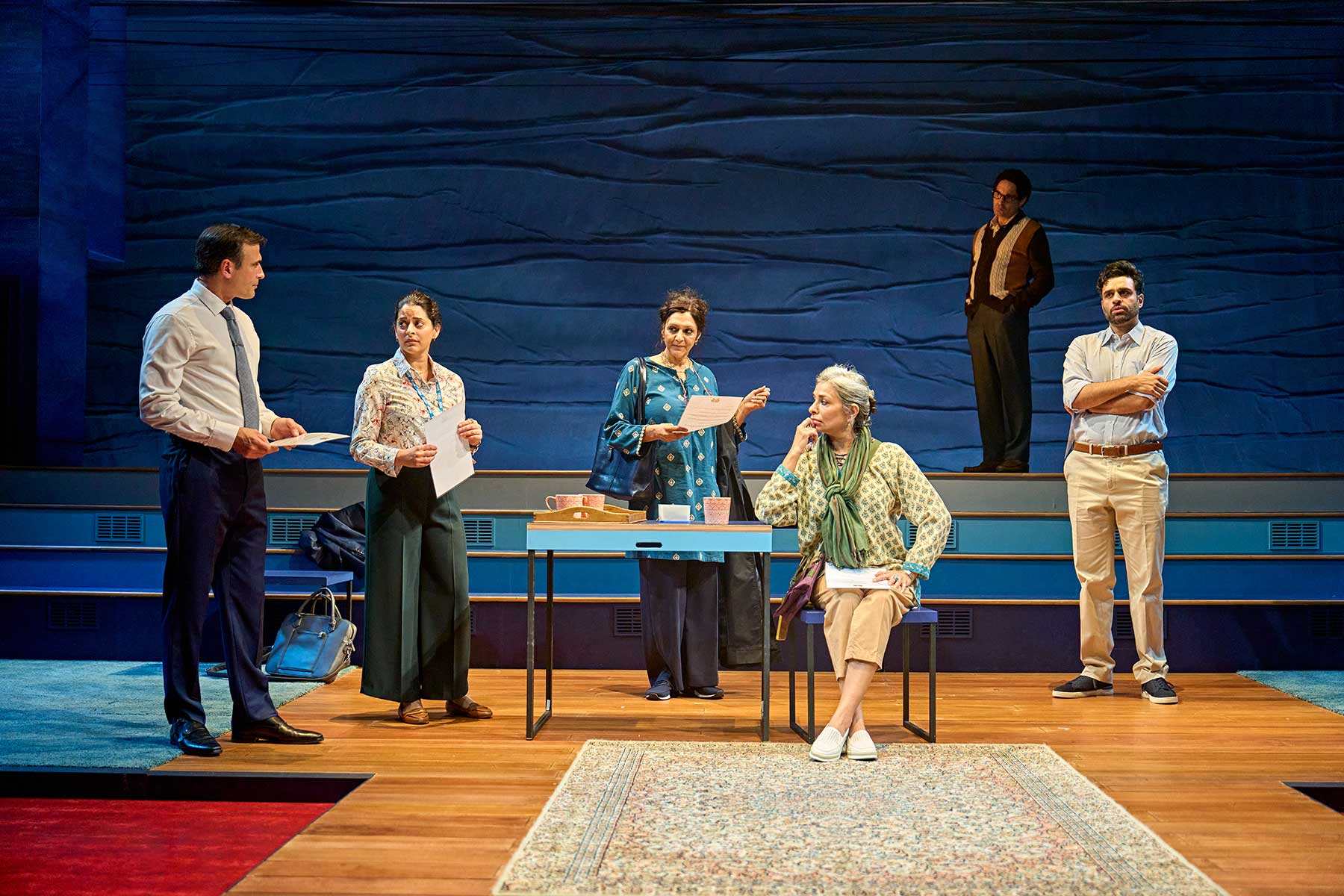
Years ago, I watched Tanika Gupta’s play ‘Sugar Mummies’ at The Royal Court and was completely captivated. Gupta’s storytelling stands out for its ability to address real life issues in a way that’s both powerful and relatable. Her writing in A Tupperware of Ashes is no exception and offers the same sharp insight and emotional resonance.
Written by Tanika Gupta and directed by Pooja Ghai, ‘A Tupperware of Ashes’ is set just as the pandemic is starting to surface. Michelin-star restaurant owner Queenie (Meera Syal) is facing numerous challenges. From managing her Indian restaurant to finding out that her son Raj (Raj Bajaj) is expecting a baby with a woman she dislikes, Queenie is struggling to keep it together. Her mind is overwhelmed, and she’s beginning to forget things, like what day it is.
Since the death of her beloved husband Ameet (Zubin Varla), Queenie depends on her three grown-up children and best friend Indrani (Shobna Gulati) for emotional support. But with her children busy with their own lives, Queenie feels increasingly out of place.
As the play progresses, Queenie’s daughter Kamala (Natalie Dew), urges her to have a brain assessment. What Queenie assumes is a routine check-up leads to a devastating diagnosis of Alzheimer’s disease. As Queenie’s condition worsens, she spends more time talking to her late husband, blending reality with memories and stories she believes to be true. She refuses to eat and becomes increasingly disconnected from her family.
With the pressure mounting, Queenie’s children make the difficult decision to place her in a care home, breaking with tradition. Heartbroken, Queenie is frustrated but has little control as Alzheimer’s takes over. For comfort, she reflects on her younger days in her home town in Bangladesh with Ameet.
As Covid intensifies and her children putting her into a care home, the question remains: will Queenie ever regain control of her life, or will Alzheimer’s claim her entirely?
The set, cleverly designed by Rosa Maggiora, reflects both the landscape of Queenie’s life and her mental state. From the Indian rivers to a care home, the simple yet intricate design perfectly complements the play. Rosa’s costume design enhances each character, blending modern elements while staying true to tradition.
I particularly enjoyed how the lighting, designed by Matt Haskins, brought the stage to life. The ethereal illusion of water created by the lighting really stood out, adding a magical touch to the overall production.
There were many moments in the play that not only impressed me but also cleverly highlighted how the mind can deceive, particularly in Queenie’s case. From dressing gowns transforming into saris to mangoes falling from the sky, John Bulleid’s illusions were very clever and emphasized the endless tricks Queenie’s mind was playing on her.
While I enjoyed many aspects of the play, I found the first half a bit slow, with some characters feeling underdeveloped. However, by the second half, the story gained momentum, and the characters felt more developed and believable.
What I really appreciated was the tender moments when Queenie’s family reunited in India, as well as the moments that highlighted the harsh reality of the pandemic’s impact, especially on those in hospitals.
Seeing a South Asian family on stage was a highlight for me. It’s so important for audiences to learn more about different cultures, and this play offers valuable insights into a Bengali family and the experiences many South Asian families faced when moving to the UK. We definitely need more South Asian stories on stage!
One of the main themes in the play, is around the care system and the difficult question of whether it’s okay to place a parent in a care home. In Black and Brown communities, care homes are often frowned upon, as we are taught to care for our elders at home, rather than following the Western practice of using care homes. It’s a complex issue without a clear right or wrong answer, but it clearly resonated with the audience, as many around me were deeply moved, sobbing at the thought of Queenie being away from home. That’s the power of theatre – it can often tell stories that reflect your own life, and sometimes, that can be painful to see.
‘A Tupperware of Ashes’ is a vulnerable and extremely moving play. It opens your eyes to Alzheimer’s, revealing the devastating impact it can have on individuals and their families. It’s not always an easy watch, but it serves as a powerful reminder to appreciate life and find meaning in even the smallest moments. It’s unique, insightful, and rich in culture, yet heartbreaking and sad, and will resonate with many who experience it.
A Tupperware of Ashes plays at the National Theatre until 16 Nov 2024.
























